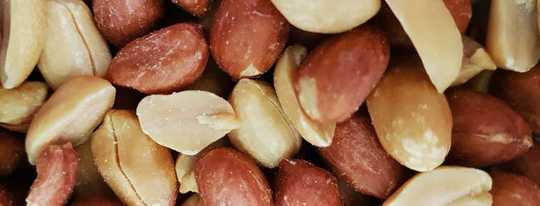 The humble peanut. Tasty for most, treacherous for some. Dr Dwan Price, Author provided
The humble peanut. Tasty for most, treacherous for some. Dr Dwan Price, Author provided
Food allergens are the scourge of the modern school lunchbox. Many foods contain proteins that can set off an oversized immune reaction and one of the fiercest is the humble peanut.
Around 3% of children in Australia have a peanut allergy, and only 1 in 5 of them can expect to outgrow it. For these unlucky people, even trace amounts of peanut can trigger a fatal allergic reaction.
But what sets the peanut apart from other nuts? Why is it so good at being an allergen?
To answer this, we have to explore the pathway from allergen to allergy, and just what it is about an allergen that triggers a response from the immune system.
Get The Latest By Email
How food gets to the immune system
Before coming into contact with the immune system, an allergen in food needs to overcome a series of obstacles. First it needs to pass through the food manufacturing process, and then survive the chemicals and enzymes of the human gut, as well as cross the physical barrier of the intestinal lining.
After achieving all of this, the allergen must still have the identifying features that trigger the immune system to respond.
Many food allergens successfully achieve this, some better than others. This helps us to understand why some food allergies are worse than others.
The most potent allergens – like peanuts – have many characteristics that successfully allow them to overcome these challenges, while other nuts display these traits to a lesser extent.
Strength in numbers
The first characteristic many allergenic foods have, especially peanuts, is strength in numbers. Both tree nuts and peanuts contain multiple different allergens. At last count, cashews contain three allergens, almonds have five, walnuts and hazelnuts have 11 each and peanuts are loaded with no less than 17.
Each allergen has a unique shape, so the immune system recognises each one differently. The more allergens contained in a single food, the higher the potency.
Additionally, many of these allergens also have numerous binding sites for both antibodies and specialised immune cells, further increasing their potency.
Stronger through scorching
The first hurdle for a food allergen is the food manufacturing process. Many nuts are roasted prior to consumption. For most foods, heating changes the structure of proteins in a way that destroys the parts that trigger an immune response. This makes them far less potent as allergens.
This is not the case for many tree nuts: allergens in almonds, cashews and hazelnuts survived roasting with no loss of potency.
And for the major peanut allergens, it’s even worse. Roasting actually makes them more potent.
The gauntlet of the gut
From here, the allergen will have to survive destruction by both stomach acid and digestive enzymes within the human gut. Many nut allergens have the ability to evade digestion to some degree.
Some simply have a robust structure, but peanut allergens actively inhibit some of the digestive enzymes of the gut. This helps them safely reach the small intestine, where the allergens then need to cross the gut lining to have contact with the immune system.
This is where peanut allergens really stand apart from most other allergens. They have the ability to cross the intestinal cells that make up the gut lining. Given their relative sizes, this is like a bus squeezing itself through a cat flap.
Peanut allergens accomplish this remarkable feat by altering the bonds that hold the gut cells together. They can also cross the lining by hijacking the gut’s own ability to move substances. Once across, the allergens will gain access to the immune system, and from there an allergic response is triggered.
 Peanut allergens attack the bonds that hold intestinal cells together. Dr Dwan Price, Author provided
Peanut allergens attack the bonds that hold intestinal cells together. Dr Dwan Price, Author provided
The combination of multiple allergens, numerous immune binding sites, heat stability, digestion stability, enzyme blocking, and the effect on the gut lining makes peanut a truly nasty nut.
Where to from here?
This leaves us with a nagging question: if peanuts are so potent, why doesn’t everyone develop a peanut allergy? We still don’t know.
Recently, a potential vaccine developed by researchers from the University of South Australia has shown promise in reprogramming the immune system of mice and blood taken from people with peanut allergy. Will this translate to a potential treatment for peanut allergy? We will have to wait and see.
For now, the more we learn about the action of allergens, and the more we understand their effects on our body, the more we can develop new ways to stop them. And eventually, we might outsmart these clever nuts for good.![]()
About the Author
Dwan Price, Molecular Biologist and Postdoc @ Deakin AIRwatch pollen monitoring system., Deakin University
This article is republished from The Conversation under a Creative Commons license. Read the original article.
books_nutrition







